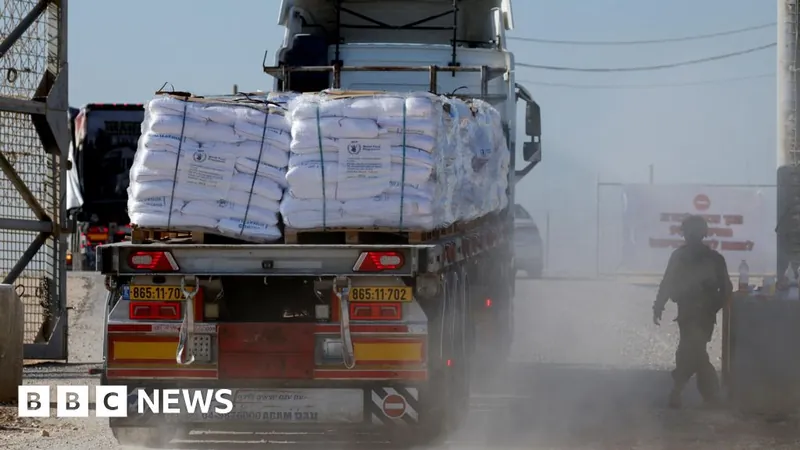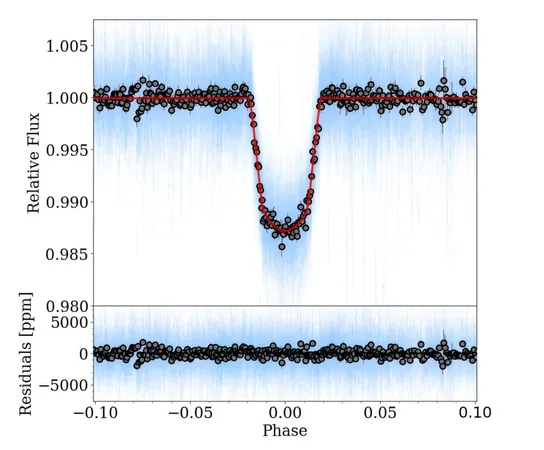
Lawlessness in South Gaza Threatens Vital Humanitarian Aid Distribution
2024-11-26
Author: Sophie
Amidst a Dire Humanitarian Crisis: Criminal Gangs Hold Aid Hostage in South Gaza
In a region already grappling with extreme food shortages, the situation in southern Gaza has deteriorated further due to rampant gang violence. Aid workers and local residents report that criminal organizations are now the primary barrier to distributing essential supplies, with armed groups openly operating near the Israel Defense Forces (IDF) in a restricted border zone.
The United Nations has witnessed a surge in violent thefts, culminating in the robbery of nearly 100 UN aid trucks on November 16, leading to injuries among Palestinian drivers. This incident marked one of the most significant losses of humanitarian aid during the ongoing conflict. In response, Hamas has reactivated a special security force, aiming to regain control and restore order in the face of increasing lawlessness.
Local testimonies indicate that notorious criminal families have blocked critical access routes, such as the Salah al-Din Road from Israel’s Kerem Shalom crossing. Witnesses described a scene of escalating tension, with barriers erected to halt aid lorries and gunfire directed towards those attempting to deliver supplies. Sam Rose, a deputy director of UNRWA, the UN agency for Palestinian refugees, expressed grave concern over the collapse of law and order, emphasizing that the chaos is an inevitable outcome following over a year of fierce conflict.
As the rainy winter season begins, the urgency to address these growing challenges intensifies. Georgios Petropoulos, head of OCHA (the UN's Office for the Coordination of Humanitarian Affairs) in Gaza, warned that the ongoing violence is creating a vicious cycle of “ultra-violence,” as tensions mount between looters, IDF forces, and local law enforcement.
Former Hamas officials have reported a significant decline in the organization's security control, dropping to below 20%. Plans are underway to restore authority, but skepticism remains rampant among residents. While some displaced individuals support Hamas’s new crackdown on thieves, viewing it as a positive step, others perceive it as a strategic maneuver to eliminate competition in the lucrative aid black market.
The ongoing crisis is compounded by the failure of Israeli leaders to forge a viable post-war plan for Gaza, leaving a vacuum that sees Hamas attempting to consolidate power amid rising criminality. The situation is critical, especially as the volume of humanitarian aid entering Gaza has significantly dropped, leading to severe shortages of food, medicine, and essential goods.
Desperate residents in southern Gaza are facing skyrocketing prices for basic necessities. For example, a bag of flour is now priced at over $200, and basic items such as eggs are being sold at extreme markups. Families line up for hours outside bakeries, only to leave without sufficient provisions. One mother, named Umm Ahmed, lamented, "My children are hungry every day. We can’t afford the basics. We just want to live a decent life."
Despite the US urging Israel to increase aid deliveries, officials cite logistical limitations posed by international aid organizations. Nonetheless, aid workers assert that the restrictions imposed by Israeli authorities are crippling efforts to deliver much-needed support, arguing that Israel, as the occupying power, bears a responsibility to ensure security and protection for humanitarian operations.
There are alarming indications that the looting is occurring under the watchful eyes of Israeli soldiers and surveillance drones, yet there appears to be little intervention from the military. Some reports allege that stolen goods are being stored in areas under Israeli military control, raising questions about accountability.
As the conflict lingers, the humanitarian situation worsens, with supply routes consistently looted. For instance, smuggling operations have surged, with gangs reportedly intercepting aid convoys and exploiting the desperate conditions in Gaza. The price of cigarettes has spiraled out of control, and smuggling networks have thrived in the chaos, revealing a disturbing underbelly of crime amidst the humanitarian disaster.
In recent weeks, Israeli authorities have maintained a ban on commercial imports, a move justified by the belief that such goods could enhance Hamas's capabilities. This has further exacerbated shortages and escalating desperation across the territory.
As international pressure mounts, a troubling development has arisen: discussions are underway regarding the potential use of a private armed American security contractor to oversee aid distribution. Such a plan raises immediate concerns about safety and efficacy, with aid workers fearing it could lead to further violence instead of relief.
In the midst of this turmoil, time is running out for the people of Gaza, who are caught in a relentless cycle of suffering as they await a solution to their dire humanitarian needs. The world watches closely, hoping for a resolution that might restore order and dignity to a population ravaged by conflict.









 Brasil (PT)
Brasil (PT)
 Canada (EN)
Canada (EN)
 Chile (ES)
Chile (ES)
 España (ES)
España (ES)
 France (FR)
France (FR)
 Hong Kong (EN)
Hong Kong (EN)
 Italia (IT)
Italia (IT)
 日本 (JA)
日本 (JA)
 Magyarország (HU)
Magyarország (HU)
 Norge (NO)
Norge (NO)
 Polska (PL)
Polska (PL)
 Schweiz (DE)
Schweiz (DE)
 Singapore (EN)
Singapore (EN)
 Sverige (SV)
Sverige (SV)
 Suomi (FI)
Suomi (FI)
 Türkiye (TR)
Türkiye (TR)